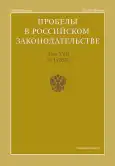The Essence and Procedural Form of Judicial Proceedings for the Selection of Preventive Measures
- Authors: Popov A.P.1, Pitko R.Y.1
-
Affiliations:
- Pyatigorsk State University
- Issue: Vol 17, No 1 (2024)
- Pages: 113-121
- Section: Criminal Law Sciences
- URL: https://journal-vniispk.ru/2072-3164/article/view/254138
- EDN: https://elibrary.ru/MZPLHH
- ID: 254138
Cite item
Abstract
The article delves into the fundamental nature and procedural aspects of legal proceedings regarding the selection of preventive measures in judicial processes. It dissects the fundamental principles and protocols dictating how judges arrive at decisions concerning the imposition of preventive measures. Various facets of this process are explored, encompassing subjective composition, the rights and responsibilities of involved parties, the conduct of hearings, and the ultimate decision-making by the court. Additionally, the authors deliberate on potential adjustments and enhancements within this domain, aiming to bolster the efficacy and impartiality of judicial proceedings related to preventive measures.
This research paper aims to scrutinize the fundamental nature and procedural framework of judicial proceedings concerning the selection of preventive measures in criminal cases. It scrutinizes the procedural intricacies, deliberates on the core principles and objectives guiding this process, and evaluates its efficacy.
Throughout the study, an examination of pertinent laws, regulations, and judicial precedents governing the selection of preventive measures was conducted. Furthermore, an analysis of cases from judicial practice was undertaken to discern prevalent trends and distinctive aspects of this procedural realm.
The study's findings lead to the inference that both the fundamental essence and procedural structure of judicial proceedings pertaining to the selection of preventive measures hold significance in upholding legality and justice in criminal proceedings. On the basis of the studied signs of judicial proceedings on the election of preventive measures, this category is undoubtedly recognized as an independent type of criminal procedural proceedings, which arises and proceeds within the framework of the main pre-trial proceedings. Only the proper application of this procedure guarantees the protection of the rights of both accused (suspects) and victims, while ensuring the security of society and the State. Nonetheless, there exist certain issues and deficiencies necessitating further exploration and legislative refinement within this sphere.
Full Text
##article.viewOnOriginalSite##About the authors
Alexey P. Popov
Pyatigorsk State University
Author for correspondence.
Email: P.aleksey777@mail.ru
ORCID iD: 0000-0001-5930-0364
SPIN-code: 6520-8131
Scopus Author ID: 752825
Dr.Sci.(Law), Associate Professor, Professor of the Department of Criminal Law Disciplines and Forensic Expertise
Russian Federation, PyatigorskRoman Yu. Pitko
Pyatigorsk State University
Email: pitko99@list.ru
SPIN-code: 5251-4413
Scopus Author ID: 1224830
postgraduate student of the Department of Criminal Law Disciplines and Forensic Expertise
Russian Federation, PyatigorskReferences
- Abdrashitov V.M., Kakhkhorov D.G., Gavrilova V.D. Problems of implementing procedural relations between a prosecutor and an investigator on the election of a preventive measure in judicial control proceedings (on the example of detention) // Legal Concept. 2021. Vol. 20. No. 2. pp. 57-64.
- Vershinina S.I. On improving the institution of preventive measures provided for in Chapter 13 of the Code of Criminal Procedure of the Russian Federation // Journal of Russian Law. 2017. No. 6. pp. 118-120.
- Vlasov V. I. The activity of the court in making court decisions on the application of certain measures of procedural restraint, coercion and authorization of the production of certain investigative actions // Business. Education. Right. 2021. №. 3. Pp. 265-270.
- Ivanova O. G. Criminal procedural proceedings on the election of a preventive measure by the court. Monograph / O.G. Ivanova. Krasnoyarsk : Sib. feder. Univ., 2019. 176 p.
- Karetnikov A., Arzamastseva K. Familiarization of the defense side with the materials substantiating the grounds for the court's election of a preventive measure in the form of detention // Legality. No. 3. 2012. p. 32.
- Konovalova M. A. Actual problems of the election and application of preventive measures during the spread of a new coronavirus infection //Criminal procedure and criminalistics: theory, practice, didactics. 2022. pp. 193-196.
- Kostenko D. S. Features of the implementation of the prosecutor's status in the election of preventive measures requiring a court decision // Actual problems of prosecutorial activity: 300 years on guard of the Russian statehood. 2021. pp. 93-96.
- Pitko R.Y. Criminal procedural form: concept, signs and correlation with other procedural categories // Issues of Russian and international law. 2023. vol. 13. No. 9-1. pp. 463-472.
- Polityko O. E. Prohibition of certain actions as a structural element of the institution of preventive measures //activity of law enforcement agencies in modern conditions. 2022. pp. 137-139.
- Sukhova I. I. Responsibility for the unjustified election of a preventive measure, permissible only by judicial decision // Actual problems of preliminary investigation. 2020. pp. 181-186.
- Troinina I. S. Judicial control over the legality and validity of the application of preventive measures against juvenile suspects, accused // Bulletin of the Voronezh State University. Series: Law. 2021. No. 2 (45). pp. 247-251.
- Ustinov A. A. The validity of suspicion of involvement in a committed crime when a court chooses a preventive measure // Legal science and law enforcement practice. 2021. No. 1 (55). pp. 27-33.
- Tsokolova O.I., Bezrukov S.S. Problems of implementing the principle of competition in the election of preventive measures // Bulletin of Tomsk State University. Right. 2019. No. 33. pp. 175-186
- Shadrin V. S., Androsov S. V. On the correlation of prosecutorial supervision and judicial control over the procedural activities of the preliminary investigation bodies // Criminalist. 2016. No. 2 (19). pp. 66-69.
- Shilishpanova L. A. Preventive measures in Russian criminal legislation // Bulletin of Science. 2022. Vol. 1. No. 11 (56). pp. 197-200.
Supplementary files








